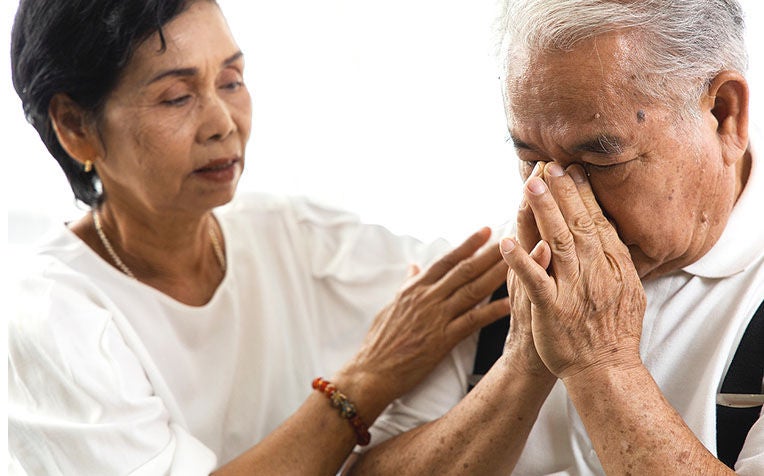
Helping a loved one overcome aphasia (diffiulty communicating) requires patience, understanding and encouraging your loved one to express himself using a combination of methods.
About one in three stroke survivors have difficulty speaking and communicating.
Stroke survivors can face problems with walking, muscle stiffness and swallowing. But one of the most frustrating complications can be difficulties using language to speak and communicate. The medical term for this is aphasia and the most common cause is stroke. However, the condition can also affect people with traumatic brain injuries or brain tumours.
"Aphasia can affect a person’s ability to speak, read, write and understand conversations but it does not affect their intelligence," shares Speech Therapist Iris Lee Jin from Outram Community Hospital (part of SingHealth Community Hospitals), a member of the SingHealth group.
"Although it (aphasia) can limit a person's ability to express himself or herself, people with aphasia also have their thoughts and ideas that they would like to share in conversations," she added.
Caregivers or conversation partners can employ strategies to create a supportive communication environment to engage people with aphasia in conversations.
Watch the video!
Tips to overcome communication difficulties (aphasia)
When communicating with a loved one who has aphasia
Get their attention before speaking to them and maintain eye-contact.
Remove distractions in the environment such as music or background noises.
Speak slowly and use shorter sentences with simple, everyday words. Avoid sarcasm and complex humour.
Discuss only one idea at a time. Avoid overstimulating the patient with different topics and give them enough time to respond.
Speak with the same level of respect as before the person suffered a stroke. Do not treat them like a child – talk normally with your usual tone of voice.
Support your speech with gestures, tone of voice, facial expression and pictures if necessary.
7 Ways to help a person with communication difficulty (aphasia) manage it better
Encourage them to express themselves through a combination of words, gestures, writing or drawing if they have trouble getting their message across.
Practice makes perfect. Create opportunities for them to practise having conversations. This helps prevent stroke survivors from becoming withdrawn, which is common after stroke.
Attempt to identify the general topic that they are talking about first before trying to understand the details: e.g. identify that they are talking about food then proceed to understand details such as food preferences.
Ask Yes/No questions to clarify their points.
Do not pretend to understand if you do not. This can demoralise the stroke survivor. Instead, encourage them to try again later.
Allow rest periods between attempts to prevent burn out.
Be empathetic to their loss. Do not leave them out from conversations just because they are unable to share their thoughts readily with you.
"As a caregiver, be patient and continue to engage your loved ones with aphasia in conversations. Together with speech therapy treatment, your loved ones may be able to regain some skills,” advises Iris.
Symptoms of aphasia (difficulty communicating) include:

You may also click on the links of the SingHealth Speech Therapy Departments with the relevant services to find out more or obtain contact details:
Sengkang General Hospital (SKH)
Singapore General Hospital (SGH)
This article was adapted from Neuslink Issue 18.
Ref: I23
Contributed by


















 Get it on Google Play
Get it on Google Play